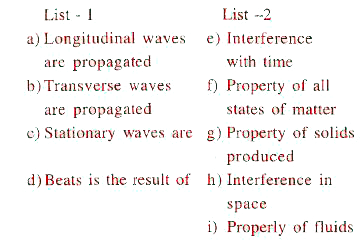(A): Both transverse and longitudinal mechanical waves can travel through solids, whereas only longitudinal mechanical waves can travel through gases.
(R): Gases do not have rigidity modulus.Solution in Telugu
Both 'A' and 'R' are true and 'R' is the correct, explanation of 'A'.
Both 'A' and 'R' are true and 'R' is not the correct explanation of 'A'
A' is true and 'R' is false
Both 'A' and 'R' are false
The correct Answer is:A
Step by step video, text & image solution for (A): Both transverse and longitudinal mechanical waves can travel through solids, whereas only longitudinal mechanical waves can travel through gases. (R): Gases do not have rigidity modulus. by Physics experts to help you in doubts & scoring excellent marks in Class 12 exams.
Updated on:21/07/2023Topper's Solved these Questions
- WAVESBook:AAKASH SERIESChapter:WAVESExercise:EXERCISE-II (Wave Equations & Basics :)
Explore 19 Videos
- WAVESBook:AAKASH SERIESChapter:WAVESExercise:EXERCISE-II (Strings (Speed of a travelling wave:))
Explore 23 Videos
- WAVESBook:AAKASH SERIESChapter:WAVESExercise:EXERCISE-IA (Matching )
Explore 4 Videos
- WAVE OPTICSBook:AAKASH SERIESChapter:WAVE OPTICSExercise:PROBLEMS (LEVEL - II)
Explore 20 Videos
- WAVES OPTICSBook:AAKASH SERIESChapter:WAVES OPTICSExercise:EXERCISE -III (POLARISITION)
Explore 10 Videos
Similar Questions
Which of the following expressions represents a simple harmonic progressive wave
View SolutionLength of a string tied to two rigid supports is 40 cm. Maximum wavelength in cm of a stationary wave produced on it is
View SolutionMatch the following

View SolutionIn Young's double slit experiment the y co-ordinates of central maxima and 10th maxima are 2 cm and 5 cm respectively. When the YDSE apparatus is immersed in a liquid of refractive index 1.5. Find the corresponding y co-ordinates.
View SolutionA ray of light is incident on the surface of a glass plate of refractive index √3 at the polarising angle . The angle of refraction of the ray is
View SolutionAssertion : Solids can support both longitudinal and transverse waves but only longitudinal waves can propagate in gases.
Reason : For the propagation of transverse waves, medium must also necessarily have the property of rigidity.
View SolutionSound travels in rocks in the form of both longitudinal and transverse waves, but in air, sound travels only in the form of longitudinal waves'. Explain
View Solutionस्पष्ट कीजिए
ठोस अनुदैर्घ्य तथा अनुप्रस्थ दोनों प्रकार की तरंगों का पोषण कर सकते हैं जबकि गैसों में केवल अनुदैर्घ्य तरंगें ही संचरित हो सकती हैं,
View Solutionठोसों में अनुप्रस्थ और अनुदैर्ध्य दोनों प्रकार की तरंगे संचरित हो सकती है।
View SolutionCan mechanical waves travel through vacuum ?
View Solution(A): In solids mechanical waves can be either transverse or longitudinal depending on mode of excitation.
(B) : Waves on strings are always transverse.
View Solution(A): Mechanical transverse waves can propagate only in medium with shear inodulus of elasticity (B) : Longitudinal waves need bulk modulus of elasticity and are therefore. Possible in all media, solids, liquids and gases
View Solution(A): Solids can support both longitudinal and transverse waves but only mechanical longitudinal waves can propagate in gases. (R): For the propagation of mechanical transverse waves, medium must also necessarily have the property of rigidity.
View Solution(A): Only longitudinal waves can propagate through a gas. (R): Gases have only bulk modulus.
View SolutionWhich of the following statements are true wave motion? a) Mechanical transverse waves can propagate through all mediums. b) Longitudinal waves can propagate through solids only c) Mechanical transverse waves can propagate through only d) Longitudinal waves can propagate through vacuum.
View Solution

